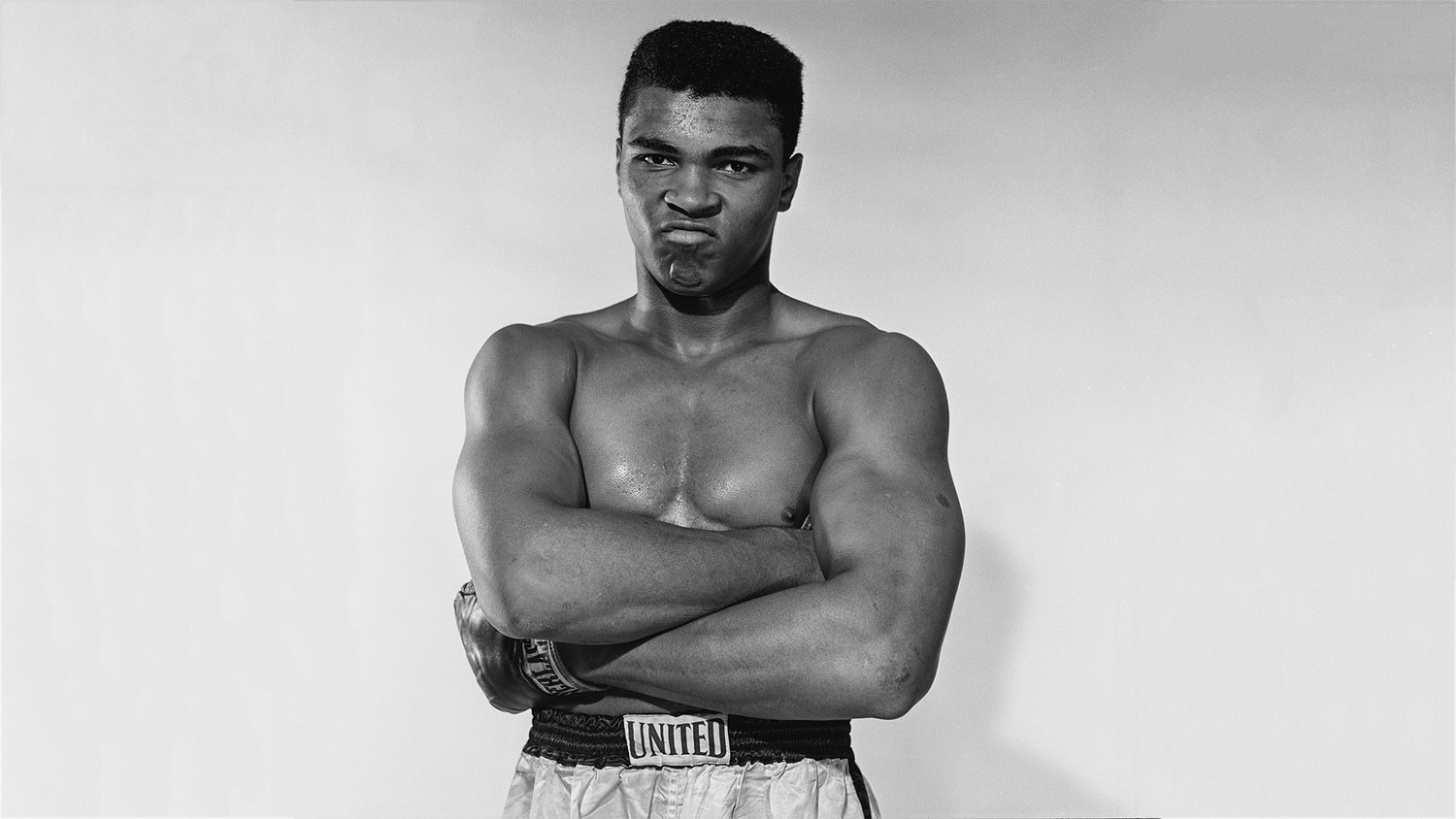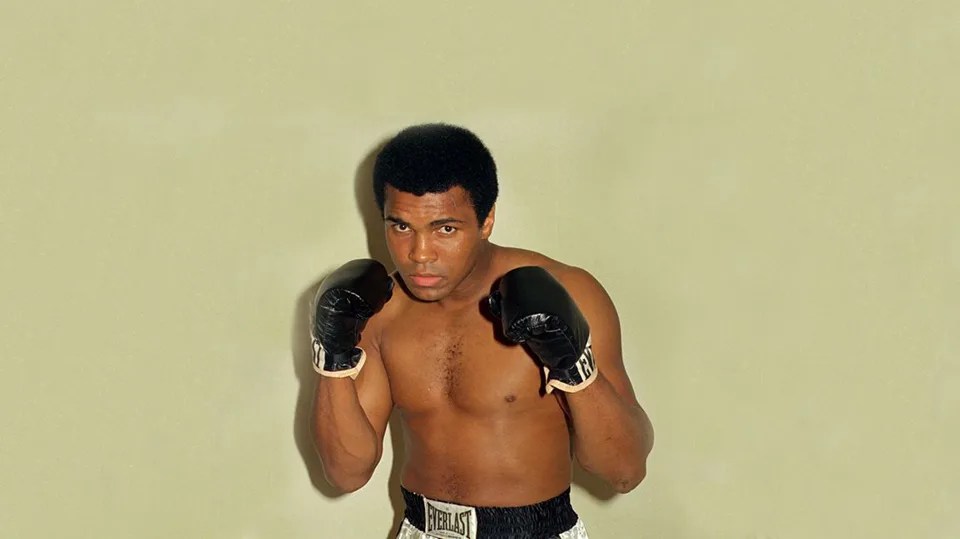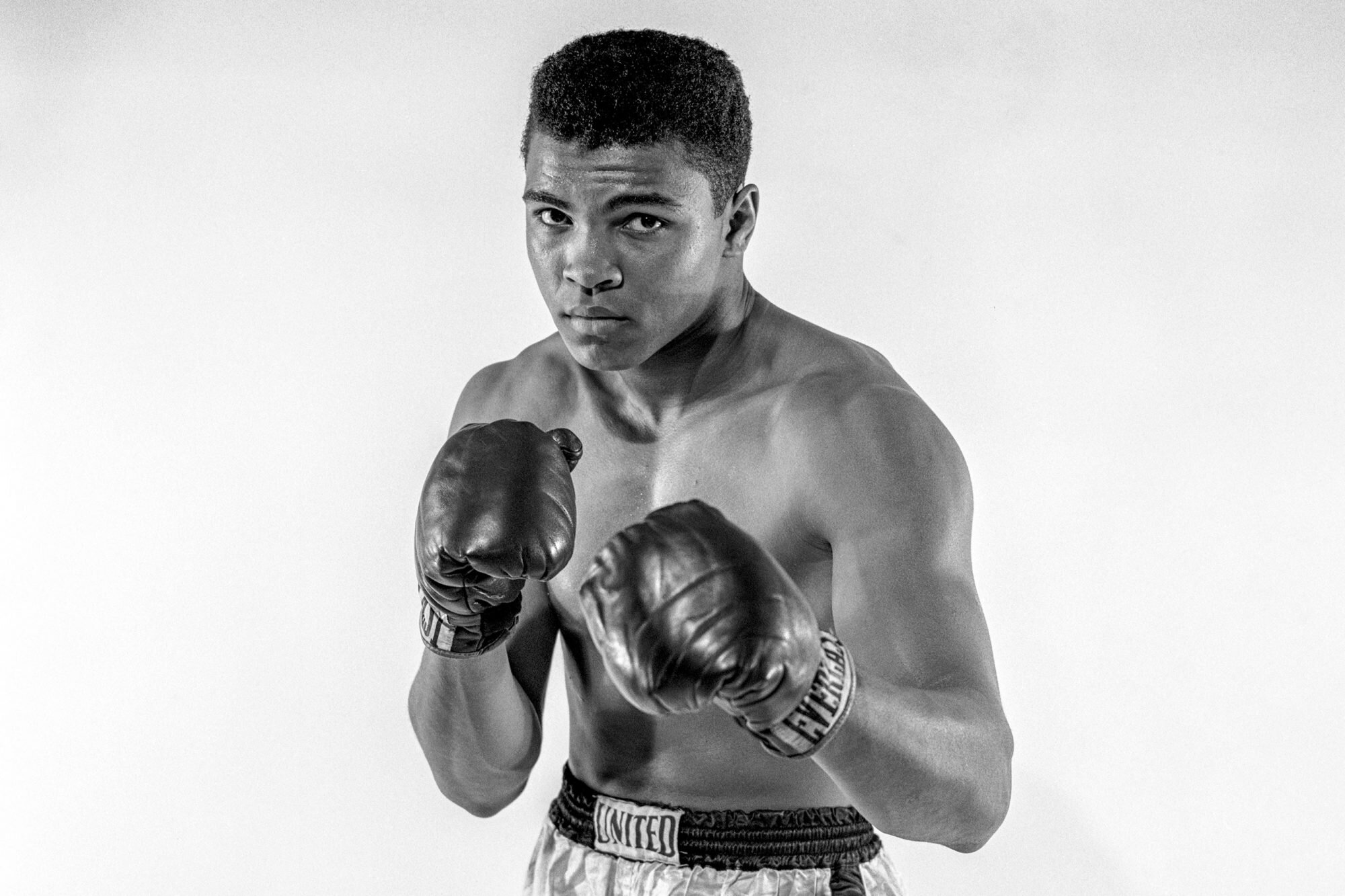Muhammad Ali became the world heavyweight boxing champion at the age of 22 on February 25, 1964. He defeated Sonny Liston in a stunning upset, winning by technical knockout in the seventh round. Ali's victory was a major upset, as Liston was considered to be one of the most dominant heavyweight champions in history. Ali's victory over Liston was a major moment in boxing history, and it helped to make him one of the most popular and iconic athletes in the world.
Ali's victory over Liston was significant for several reasons. First, it marked the beginning of Ali's dominance of the heavyweight division. Ali would go on to win the heavyweight championship a total of three times, and he would successfully defend his title 19 times. Second, Ali's victory over Liston helped to change the perception of boxing. Prior to Ali's victory, boxing was seen as a brutal and barbaric sport. However, Ali's charismatic personality and his commitment to social justice helped to change the way that people viewed boxing. Finally, Ali's victory over Liston was a major moment in the Civil Rights Movement. Ali was a vocal supporter of the Civil Rights Movement, and his victory over Liston was seen as a victory for all African Americans.
Ali's victory over Liston is still considered to be one of the greatest upsets in boxing history. It was a major moment in Ali's career, and it helped to make him one of the most popular and iconic athletes in the world.
When Did Muhammad Ali Become Champion?
Muhammad Ali became the world heavyweight boxing champion at the age of 22 on February 25, 1964. This was a major moment in his career, and it helped to make him one of the most popular and iconic athletes in the world. There are many key aspects to consider when discussing this topic, including:
- Date: February 25, 1964
- Age: 22
- Opponent: Sonny Liston
- Result: Victory by technical knockout in the seventh round
- Significance: Marked the beginning of Ali's dominance of the heavyweight division
- Legacy: One of the greatest upsets in boxing history
- Impact: Helped to change the perception of boxing and the Civil Rights Movement
Ali's victory over Liston was a major upset, as Liston was considered to be one of the most dominant heavyweight champions in history. Ali's victory helped to change the way that people viewed boxing, and it also had a major impact on the Civil Rights Movement. Ali was a vocal supporter of the Civil Rights Movement, and his victory over Liston was seen as a victory for all African Americans.
Ali's victory over Liston is still considered to be one of the greatest upsets in boxing history. It was a major moment in his career, and it helped to make him one of the most popular and iconic athletes in the world.
| Personal Details | Bio Data ||---|---|| Name | Muhammad Ali || Birth Date | January 17, 1942 || Birth Place | Louisville, Kentucky, U.S. || Death Date | June 3, 2016 || Height | 6'3" (191 cm) || Weight | 215 lbs (98 kg) || Boxing Record | 56-5 (37 KOs) |Date
The date February 25, 1964, is significant in boxing history as the day Muhammad Ali became the world heavyweight champion. Ali's victory over Sonny Liston was a major upset, as Liston was considered to be one of the most dominant heavyweight champions in history. Ali's victory marked the beginning of his dominance of the heavyweight division, and he would go on to win the heavyweight championship a total of three times.
The date February 25, 1964, is also significant in the context of the Civil Rights Movement. Ali was a vocal supporter of the Civil Rights Movement, and his victory over Liston was seen as a victory for all African Americans. Ali's victory helped to change the way that people viewed boxing, and it also had a major impact on the Civil Rights Movement.
The date February 25, 1964, is a reminder of Ali's greatness as a boxer and his commitment to social justice. Ali was one of the most popular and iconic athletes in the world, and his legacy continues to inspire people today.
Age
Muhammad Ali became the world heavyweight boxing champion at the age of 22 on February 25, 1964. This was a remarkably young age to win the heavyweight championship, and it is a testament to Ali's immense talent and skill. Most heavyweight champions are in their late 20s or early 30s when they win the title, so Ali's victory at the age of 22 was a major upset.
There are several reasons why Ali's age was such a significant factor in his victory. First, Ali was at the peak of his physical powers at the age of 22. He was incredibly fast, strong, and agile. Second, Ali had already developed a mature and sophisticated boxing style. He was a master of the jab and the footwork, and he was able to outbox Liston with ease.
Ali's victory over Liston was a major moment in boxing history. It marked the beginning of Ali's dominance of the heavyweight division, and it helped to make him one of the most popular and iconic athletes in the world. Ali's victory is also a reminder that age is not always a barrier to success. With hard work and dedication, anything is possible.
Opponent
Sonny Liston was a formidable opponent, and his presence as Ali's opponent on February 25, 1964, added significantly to the importance and impact of Ali's victory. Liston was a feared and respected heavyweight champion, known for his immense strength and intimidating presence. His record of 50-4, with 39 KOs, spoke to his dominance in the heavyweight division.
Ali's victory over Liston was a major upset, as Liston was considered to be one of the most dominant heavyweight champions in history. Ali's victory was a testament to his skill, determination, and courage. It also marked the beginning of Ali's dominance of the heavyweight division, and it helped to make him one of the most popular and iconic athletes in the world.
The fact that Ali's opponent was Sonny Liston is a key component of the story of "when did Muhammad Ali become champion." Liston was a formidable opponent, and Ali's victory over him was a major upset. This victory helped to make Ali a star, and it also had a major impact on the Civil Rights Movement. Ali's victory over Liston is still considered to be one of the greatest upsets in boxing history, and it is a reminder of Ali's greatness as a boxer and his commitment to social justice.
Result
The result of Muhammad Ali's fight against Sonny Liston on February 25, 1964, was a victory by technical knockout in the seventh round. This result is significant for several reasons.
First, it marked the moment when Ali became the world heavyweight boxing champion. Ali was a 22-year-old challenger, and Liston was the reigning champion. Liston was considered to be one of the most dominant heavyweight champions in history, and few people gave Ali a chance of winning. However, Ali surprised the world by defeating Liston in a stunning upset.
Second, the result of the fight is significant because it was a victory by technical knockout. This means that the fight was stopped by the referee because Liston was unable to continue. Ali had dominated the fight from the start, and Liston was taking a severe beating. The referee stopped the fight to protect Liston from further injury.
Ali's victory over Liston was a major moment in boxing history. It marked the beginning of Ali's dominance of the heavyweight division, and it helped to make him one of the most popular and iconic athletes in the world. The result of the fight is also significant because it showed that Ali was a truly exceptional boxer. He was able to defeat the reigning champion, even though he was a significant underdog. Ali's victory is a reminder that anything is possible with hard work and dedication.
The result of Muhammad Ali's fight against Sonny Liston is a reminder of his greatness as a boxer and his impact on the world. Ali was a true champion, both inside and outside of the ring.
Significance
Muhammad Ali's victory over Sonny Liston on February 25, 1964, was a watershed moment in boxing history. It marked the beginning of Ali's dominance of the heavyweight division, which would last for over a decade. Ali would go on to win the heavyweight championship three more times, and he would successfully defend his title 19 times.
Ali's dominance of the heavyweight division was due to a combination of factors. He was a superb boxer with a unique combination of speed, power, and agility. He was also a master of psychology, and he was able to get inside his opponents' heads and make them doubt themselves.
Ali's dominance of the heavyweight division had a major impact on boxing. He helped to make the sport more popular around the world, and he inspired a generation of young boxers. Ali was also a vocal advocate for social justice, and he used his platform to speak out against racism and poverty.
The significance of Ali's dominance of the heavyweight division cannot be overstated. He was one of the greatest boxers of all time, and he helped to change the face of the sport. Ali's legacy continues to inspire people today, and he remains one of the most iconic figures in sports history.
Legacy
Muhammad Ali's victory over Sonny Liston on February 25, 1964, is considered one of the greatest upsets in boxing history. This is due to several factors, including the fact that Liston was the reigning heavyweight champion and was considered to be one of the most dominant boxers of all time. Ali was a 22-year-old challenger with only 19 professional fights, and few people gave him a chance of winning. However, Ali surprised the world by defeating Liston in a stunning upset.
Ali's victory over Liston is significant for several reasons. First, it marked the beginning of Ali's dominance of the heavyweight division. Ali would go on to win the heavyweight championship three more times, and he would successfully defend his title 19 times. Second, Ali's victory over Liston helped to change the perception of boxing. Prior to Ali's victory, boxing was seen as a brutal and barbaric sport. However, Ali's charismatic personality and his commitment to social justice helped to change the way that people viewed boxing. Finally, Ali's victory over Liston was a major moment in the Civil Rights Movement. Ali was a vocal supporter of the Civil Rights Movement, and his victory over Liston was seen as a victory for all African Americans.
The legacy of Ali's victory over Liston is still felt today. Ali is considered to be one of the greatest boxers of all time, and his victory over Liston is still considered to be one of the greatest upsets in boxing history. Ali's victory is a reminder that anything is possible with hard work and dedication, and it continues to inspire people today.
Impact
Muhammad Ali's victory over Sonny Liston on February 25, 1964, was a major moment in boxing history. It marked the beginning of Ali's dominance of the heavyweight division, and it helped to change the perception of boxing and the Civil Rights Movement.
Prior to Ali's victory, boxing was seen as a brutal and barbaric sport. However, Ali's charismatic personality and his commitment to social justice helped to change the way that people viewed boxing. Ali was a vocal supporter of the Civil Rights Movement, and his victory over Liston was seen as a victory for all African Americans.
Ali's impact on boxing and the Civil Rights Movement was significant. He helped to change the perception of both boxing and the Civil Rights Movement, and he inspired people around the world. Ali's legacy continues to inspire people today, and he remains one of the most iconic figures in sports history.
The connection between "Impact: Helped to change the perception of boxing and the Civil Rights Movement" and "when did Muhammad Ali became champion" is significant. Ali's victory over Liston was a major moment in both boxing and the Civil Rights Movement. It helped to change the perception of both boxing and the Civil Rights Movement, and it inspired people around the world.
FAQs about Muhammad Ali Becoming Champion
This section provides answers to frequently asked questions about Muhammad Ali's iconic victory over Sonny Liston on February 25, 1964, which marked a significant milestone in boxing history.
Question 1: How old was Muhammad Ali when he became champion?
Answer: Muhammad Ali was 22 years old when he defeated Sonny Liston to become the world heavyweight boxing champion.
Question 2: Who did Muhammad Ali defeat to become champion?
Answer: Muhammad Ali defeated Sonny Liston, the reigning heavyweight champion, to claim the title.
Question 3: When did Muhammad Ali become champion?
Answer: Muhammad Ali became champion on February 25, 1964, after defeating Sonny Liston in a stunning upset.
Question 4: What was the significance of Muhammad Ali's victory?
Answer: Muhammad Ali's victory over Sonny Liston marked the beginning of his dominance of the heavyweight division and had a profound impact on boxing and the Civil Rights Movement.
Question 5: Why was Muhammad Ali's victory considered an upset?
Answer: Muhammad Ali was a 22-year-old challenger with only 19 professional fights, while Sonny Liston was the reigning champion and considered one of the most dominant boxers of all time.
Question 6: What is Muhammad Ali's legacy?
Answer: Muhammad Ali is remembered as one of the greatest boxers of all time, a social activist, and a global icon who transcended sports and left a lasting impact on society.
Summary: Muhammad Ali's victory over Sonny Liston in 1964 was a watershed moment in boxing history, marking the rise of a legend and serving as a catalyst for social change. Ali's exceptional talent, charisma, and unwavering commitment to justice continue to inspire generations.
Transition to the next article section:
This concludes our exploration of the key facts and significance surrounding Muhammad Ali's historic championship victory. In the following section, we will delve deeper into the broader impact of Ali's career and legacy.
Tips for Understanding the Significance of Muhammad Ali's Championship Victory
To fully grasp the magnitude of Muhammad Ali's achievement in becoming the world heavyweight boxing champion in 1964, consider the following tips:
Tip 1: Contextualize the Era: Understand the social and political climate of the early 1960s, marked by racial segregation and discrimination. Ali's victory symbolized a shift in societal attitudes and inspired hope for the Civil Rights Movement.
Tip 2: Recognize Ali's Exceptional Skills: Ali possessed an extraordinary combination of speed, agility, and power, honed through rigorous training and unwavering dedication. His innovative "rope-a-dope" technique revolutionized boxing strategy.
Tip 3: Appreciate the Upset Factor: Ali's triumph over Sonny Liston, the reigning champion, was a major upset. Liston was considered invincible, making Ali's victory even more remarkable and symbolic of overcoming adversity.
Tip 4: Consider the Cultural Impact: Ali's charismatic personality and outspoken stance on social issues made him a global icon. His victory transcended sports, inspiring countless individuals and contributing to broader cultural shifts.
Tip 5: Legacy and Inspiration: Ali's championship victory serves as a timeless reminder of the power of determination, resilience, and the pursuit of justice. His legacy continues to motivate and inspire athletes, activists, and individuals worldwide.
Summary: By considering these tips, you can gain a deeper appreciation for the significance of Muhammad Ali's championship victory. It was not merely a sporting achievement but a pivotal moment in history that reflected societal change, celebrated athletic excellence, and left an enduring legacy of inspiration.
Transition to the article's conclusion:
Muhammad Ali's victory stands as a testament to his extraordinary talent, unwavering spirit, and profound impact on the world. His legacy as a champion extends far beyond the boxing ring, serving as an enduring symbol of courage, determination, and the pursuit of a more just and equitable society.
Conclusion
Muhammad Ali's triumph over Sonny Liston in 1964 was a pivotal moment that transcended sports. It symbolized a shift in societal attitudes, inspired hope for the Civil Rights Movement, and showcased Ali's exceptional skills and unwavering determination. Ali's victory remains a timeless reminder of the power of overcoming adversity, pursuing justice, and leaving a lasting legacy.
The significance of Ali's championship victory extends far beyond the boxing ring. His charisma, outspokenness, and commitment to social issues made him a global icon. Ali's legacy continues to inspire athletes, activists, and individuals worldwide, reminding us of the importance of courage, resilience, and the pursuit of a more just and equitable society.
Muhammad Ali's championship victory stands as a testament to his greatness as a boxer and his impact on the world. His legacy is one that will continue to inspire and motivate generations to come.
Unveiling The Enigmatic World Of Amy Jackson's Husband: Secrets And Revelations
Cindy Clerico's Enduring Legacy In "Little House On The Prairie"
Unveiling Helena Seger: A Journey Of Style, Success, And Support

64 Muhammad Ali Quotes on Life and Success Inspirationfeed

4 February 1964 When Cassius Clay Became Muhammad Ali

Muhammad Ali Net Worth ABTC
ncG1vNJzZmiamaK8b63MrGpnnJmctrWty6ianpmeqL2ir8SsZZynnWTEqbHNZpuinF2iwqmtzKaYnWWRobZursScmKadXZi1ornPoqanZpipuq0%3D